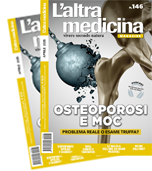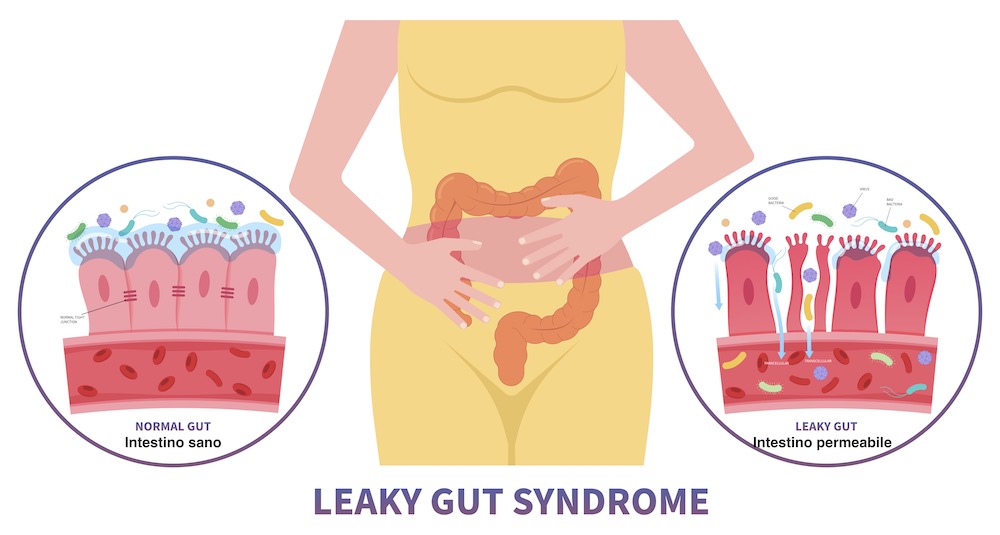Bibliografia articolo pubblicato sul n. 136 de L’altra medicina magazine
Gut microbiota e leaky gut: due termini da conoscere+
di Guido Marini
1. Scott KP, et al. The influence of diet on the gut microbiota.
Pharmacol Res. 2013;69:52-60.
2. Flint HJ, et al. The impact of nutrition on intestinal bacterial
communities. Curr Opin Microbiol. 2017;38:59-65.
3. Yatsunenko T, et al. Human gut microbiome viewed across age
and geography. Nature. 2012;486:222-7.
4. De Filippo C, et al. Impact of diet in shaping gut microbiota
revealed by a comparative study in children from Europe and rural
Africa. Proc Natl Acad Sci U S A. 2010;107:14691-6.
5. Arumugam M, et al. Enterotypes of the human gut microbiome.
Nature. 2011;473:174-80.
6. Patrascu O, et al. A fibrolytic potential in the human ileum
mucosal microbiota revealed by functional metagenomic. Sci Rep.
2017;7:40248.
7. Scott KP, et al. Dietary fibre and the gut microbiota. Nutr Bull.
2008;33:201-11.
8. Russell WR, et al. Anti-inflammatory implications of the microbial
transformation of dietary phenolic compounds. Nutr Cancer.
2008;60:636-42.
9. Turnbaugh PJ, et al. An obesity-associated gut microbiome with
increased capacity for energy harvest. Nature. 2006;444:1027-31.
10. Le Roy T, et al. Intestinal microbiota determines development of
non-alcoholic fatty liver disease in mice. Gut. 2013;62:1787-94.
11. Wang Z, et al. Gut flora metabolism of phosphatidylcholine
promotes cardiovascular disease. Nature. 2011;472:57-63.
12. Ropert A, et al. Colonic fermentation and proximal gastric tone in
humans. Gastroenterology. 1996;111:289-96.
13. Piche T, et al. Modulation by colonic fermentation of LES
function in humans. Am J Physiol Gastrointest Liver Physiol.
2000;278:G578-84.
14. Piche T, et al. Colonic fermentation influences lower esophageal
sphincter function in gastroesophageal reflux disease.
Gastroenterology. 2003;124:894-902.
15. Zerbib F, et al. Clinical, but not oesophageal pH-impedance,
profiles predict response to proton pump inhibitors in gastrooesophageal reflux disease. Gut. 2012;61:501-6
16. Bode L. The functional biology of human milk oligosaccharides.
Early Hum Dev. 2015;91:619-22.
17. Pannaraj PS, et al. Association Between Breast Milk Bacterial
Communities and Establishment and Development of the Infant
Gut Microbiome. JAMA Pediatr. 2017;171:647-654.
18. Ding T, Schloss PD. Dynamics and associations of microbial
community types across the human body. Nature. 2014;509:357-60.
19. Gartner LM, et al. Breastfeeding and the use of human milk.
Pediatrics. 2012;129:e827-e841.
20. Singh RK, et al. Influence of diet on the gut microbiome and
implications for human health. J Transl Med. 2017;15:73.
21. Eid N, et al. The impact of date palm fruits and their component
polyphenols, on gut microbial ecology, bacterial metabolites and
colon cancer cell proliferation. J Nutr Sci. 2014;3:e46.
22. Francavilla R, et al. Effect of lactose on gut microbiota and
metabolome of infants with cow’s milk allergy. Pediatr Allergy
Immunol. 2012;23:420-7.
23. Suez J, et al. Artificial sweeteners induce glucose intolerance by
altering the gut microbiota. Nature. 2014;514:181-6.
24. Cummings JH, Englyst HN. What is dietary fibre? Trends Food Sci
Technol. 1991;2:99-103.
25. Cotillard A, et al. Dietary intervention impact on gut microbial
gene richness. Nature. 2013;500:585-8.
26. Martínez I, et al. Gut microbiome composition is linked to whole
grain-induced immunological improvements. ISME J. 2013;7:269-80.
27. West NP, et al. Butyrylated starch increases colonic butyrate
concentration but has limited effects on immunity in healthy
physically active individuals. Exerc Immunol Rev. 2013;19:102-19.
28. Keim NL, Martin RJ. Dietary whole grain–microbiota
interactions: insights into mechanisms for human health. Adv Nutr.
2014;5:556-7.
29. Ze X, et al. Ruminococcus bromii is a keystone species for the
degradation of resistant starch in the human colon. ISME J.
2012;6:1535-43.
30. Ben David Y, et al. Ruminococcal cellulosome systems from
rumen to human. Environ Microbiol. 2015;17:3407-26.
31. Duncan SH, et al. Wheat bran promotes enrichment within the
human colonic microbiota of butyrate-producing bacteria that
release ferulic acid. Environ Microbiol. 2016;18:2214-25.
32. Walker AW, et al. Dominant and diet-responsive groups of
bacteria within the human colonic microbiota. ISME J. 2011;5:220-30.
33. Martínez I, et al. Resistant starches types 2 and 4 have differential
effects on the composition of the fecal microbiota in human
subjects. PLoS One. 2010;5:e15046.
34. Chung WS, et al. Modulation of the human gut microbiota by
dietary fibres occurs at the species level. BMC Biol. 2016;14:3.
35. Walker AW, et al. pH and peptide supply can radically alter
bacterial populations and short-chain fatty acid ratios within
microbial communities from the human colon. Appl Environ
Microbiol. 2005;71:3692-700.
36. El Oufir L, et al. Relations between transit time, fermentation
products, and hydrogen consuming flora in healthy humans. Gut.
1996;38:870-7.
37. Lewis SJ, Heaton KW. Increasing butyrate concentration in the
distal colon by accelerating intestinal transit. Gut. 1997;41:245-51.
38. David LA, et al. Diet rapidly and reproducibly alters the human
gut microbiome. Nature. 2014;505:559-63.
39. Świątecka D, et al. The study on the impact of glycated pea
proteins on human intestinal bacteria. Int J Food Microbiol.
2011;145:267-72.
40. Meddah AT, et al. The regulatory effects of whey retentate from
bifidobacteria fermented milk on the microbiota of the Simulator
of the Human Intestinal Microbial Ecosystem (SHIME). J Appl
Microbiol. 2001;91:1110-7.
41. Romond MB, et al. Cell-free whey from milk fermented with
Bifidobacterium breve C50 used to modify the colonic microflora
of healthy subjects. J Dairy Sci. 1998;81:1229-35.
42. Reddy BS, et al. Effects of high risk and low risk diets for colon
carcinogenesis on fecal microflora and steroids in man. J Nutr.
1975;105:878-84.
43. Juste C. Dietary fatty acids, intestinal flora and cancer. Bull
Cancer. 2005;92:708-21.
44. Turnbaugh PJ, et al. Diet-induced obesity is linked to marked but
reversible alterations in the mouse distal gut microbiome. Cell
Host Microbe. 2008;3:213-23.
45. Lecomte V, et al. Changes in gut microbiota in rats fed a high
fat diet correlate with obesity-associated metabolic parameters.
PLoS One. 2015;10:e0126931.
46. Devkota S, et al. Dietary-fat-induced taurocholic acid promotes
pathobiont expansion and colitis in Il10-/- mice. Nature.
2012;487:104-8.
47. Caesar R, et al. Crosstalk between Gut Microbiota and Dietary
Lipids Aggravates WAT Inflammation through TLR Signaling. Cell
Metab. 2015;22:658-68.
48. Delzenne NM, Cani PD. Interaction between obesity and the gut
microbiota: relevance in nutrition. Annu Rev Nutr. 2011;31:15-31.
49. Cani PD, et al. Metabolic endotoxemia initiates obesity and insulin
resistance. Diabetes. 2007;56:1761-72.
50. Kaliannan K, et al. A host-microbiome interaction mediates
the opposing effects of omega-6 and omega-3 fatty acids on
metabolic endotoxemia. Sci Rep. 2015;5:11276.
51. Fava F, et al. The type and quantity of dietary fat and carbohydrate
alter faecal microbiome and short-chain fatty acid excretion in
a metabolic syndrome ‘at-risk’ population. Int J Obes (Lond).
2013;37:216-23.
52. Ou J, et al. Diet, microbiota, and microbial metabolites in colon
cancer risk in rural Africans and African Americans. Am J Clin
Nutr. 2013;98:111-20.
53. Wu GD, et al. Linking long-term dietary patterns with gut
microbial enterotypes. Science. 2011;334:105-8.
54. De Filippis F, et al. High-level adherence to a Mediterranean
diet beneficially impacts the gut microbiota and associated
metabolome. Gut. 2016;65:1812-1821.
55. Queipo-Ortuño MI, et al. Influence of red wine polyphenols
and ethanol on the gut microbiota ecology and biochemical
biomarkers. Am J Clin Nutr. 2012;95:1323-34.
56. Wu GD, et al. Comparative metabolomics in vegans and
omnivores reveal constraints on diet-dependent gut microbiota
metabolite production. Gut. 2016;65:63-72.
57. Ferrocino I, et al. Fecal Microbiota in Healthy Subjects Following
Omnivore, Vegetarian and Vegan Diets: Culturable Populations
and rRNA DGGE Profiling. PLoS One. 2015;10:e0128669.
58. Zimmer J, et al. A vegan or vegetarian diet substantially alters the
human colonic faecal microbiota. Eur J Clin Nutr. 2012;66:53-60.
59. Kim MS, et al. Strict vegetarian diet improves the risk factors
associated with metabolic diseases by modulating gut microbiota
and reducing intestinal inflammation. Environmental Microbioly
Reports 2013;5:765-75.
60. Bonder MJ, et al. The influence of a short-term gluten-free diet
on the human gut microbiome. Genome Med. 2016;8:45
61. Sanz Y. Effects of a gluten-free diet on gut microbiota and immune
function in healthy adult humans. Gut Microbes. 2010;1:135-7.
62. Marsh A, et al. Does a diet low in FODMAPs reduce symptoms
associated with functional gastrointestinal disorders? A
comprehensive systematic review and meta-analysis. Eur J Nutr.
2016;55:897-906.
63. Halmos EP, et al. A diet low in FODMAPs reduces symptoms of
irritable bowel syndrome. Gastroenterology. 2014;146:67-75.e5.
64. Staudacher HM, et al. Mechanisms and efficacy of dietary
FODMAP restriction in IBS. Nat Rev Gastroenterol Hepatol.
2014;11:256-66.
65. Halmos EP, et al. Diets that differ in their FODMAP content alter
the colonic luminal microenvironment. Gut. 2015;64:93-100.





